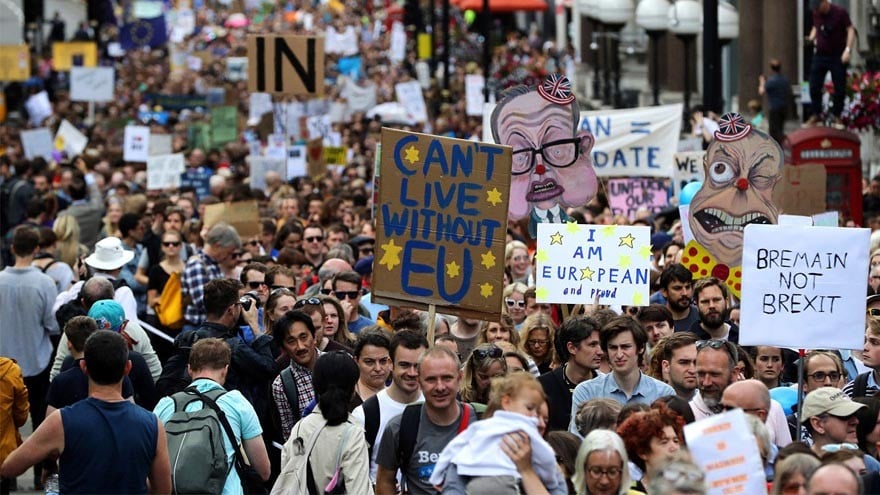

The possibility of the UK accidently tumbling out of the EU was first raised in an editorial in the influential weekly The Economist after ex-prime minister David Cameron announced an in-and-out referendum. Buffeted by his victory, in the referendum on a proportional representation system, Cameron took a gamble on the EU referendum. At the end, he recklessly lost the referendum and with it his premiership.
Though the term Brexit was fashioned in imitation of Grexit -- when Greece was on the verge of exiting the EU after its faltering economy posed to be a threat to the rest of the Eurozone -- it only became a reality in Britain when the leave campaigners won the referendum by a narrow margin in June this year. After the announcement of the result, there was much expectation that the leavers would capture the conservative party. Yet infighting in the leave camp led to the hot-favourite, Boris Johnson, dropping out of contention for leadership of the conservative party. This led to the coronation of Theresa May, a low-key remain campaigner.
In a clever move the newly anointed prime minister, May, parcelled out all cabinet positions with a stake in Brexit negotiations among key Brexiters: David Davis, Liam Fox and Johnson. While Davis was appointed minister for Brexit, Fox and Johnson were made international trade and foreign secretary respectively. The remit of all these departments impinges on negotiations about Britain’s exit from the EU. As a result, rifts were bound to arise over boundary issues between three Brexiter heavyweights.
Passing over the task of cleaning up the Brexit mess onto those who were responsible for Britain’s exit in the first place was seen as a clever move. The key Brexit issue centres on what will be the exact nature of Britain’s relationship with Europe. Even during the referendum, leavers were accused of being vague on the relationship of Britain with the EU after exiting the EU. This vagueness has persisted, with Johnson going for ‘soft Brexit’ which consists in retaining full access to single market. On the other hand, Davis stands for a ‘hard Brexit’ which means disengagement from the EU.
The tension lies between British aspirations for retaining access to EU’s single market while taking control of immigrants coming in from Europe. This is a circle hard to square since EU’s single market and free movement of people are strictly connected. Even when the fine balance between the two is found, Britain’s exact relationship with the EU will remain a conundrum. This conundrum is being debated in different policy forums within the government at cabinet and civil service level. As of yet, there is no magic formula found to fit the new relation.
One option being canvassed is that of Swiss plus model. The model is one where the country can keep access to the EU market while not being member of the European Economic Area.
Beyond this, the campaign promises of the leave camp are falling like a house of cards. One of the key planks of the campaign was UK regaining the ability to take control of its borders. This is hard to achieve if Britain wants to retain access to the EU market since access to EU market is contingent upon the principle of freedom of movement. May has expressed her intention to retain control of the UK border and establish authority to decide who comes in from the EU (EU nationals constitute the bulk of new arrivals). In a foretaste of things to come the EU has reportedly drawn up plans to introduce visa fees for British nationals visiting Europe. This shows the many unintended consequences of Brexit.
Another key pledge of the leavers was to redirect money currently being poured into the EU coffers as part of its national contribution to shore up the flagging National Health Service (NHS). The campaigners emblazoned a pledge of redirecting 350 million pounds to NHS if the UK opts out of the EU on every campaign bus. Immediately after the referendum was won the leave campaigners brazenly ditched this pledge.
Objections are coming thick and fast from many quarters. Japan, a big investor, in the UK has indicated to Britain that a full-scale exit from EU would hurt Japan’s banks and other investments in the UK which were made on the basis that London will be provide unhindered access to EU. These concerns were recently made plain in a report.
Other countries are mulling the option of relocating their operations to Germany, Brussels or Paris to gain continued access to EU’s market. If this occurs, UK’s economy, particular London’s, will be severely hit. Sensing this, London’s mayor has floated the idea of letting the city develop a special relation with Europe, accompanied by special immigration rules for those working in London.
One more point of contention is the timing of the British invocation of Article 50 which will trigger the process of exit talks with the EU. May seems in no hurry to trigger Article 50 so that she can gain as much time as possible to fine tune Britain’s position. EU leaders, however, have expressed disquiet about this delay.
Leavers were also big on peddling the notion of the UK striking quick lucrative deals with countries such as China, US and India once EU’s restrictive yoke is lifted. Yet there is no prospect of this materialising any time soon. The US president, Barak Obama, has already indicated that the US would like to deal with the EU on a priority basis, while the UK will be pushed to the back of the queue once Brexit occurs. Similarly, India and China are not rushing into trade deals with the UK until they know the final verdict of UK’s negotiations with the EU.
The post-Brexit future is full of unknowns. The implications of the flawed prospectus on which British voters were led are unveiling themselves, slowly and surely.